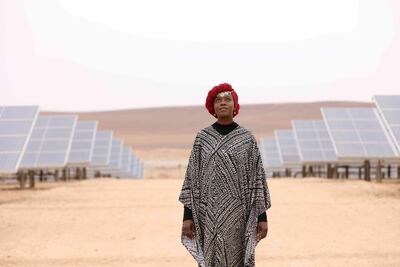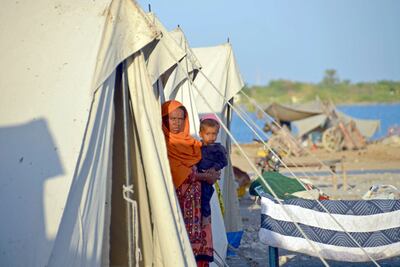The intersection of humanitarian aid and energy access has not been placed high enough on the global agenda. And yet, energy access is inextricably interwoven with the humanitarian system. Last month, the 19th Dubai International Humanitarian Aid & Development (Dihad) forum delivered a clear call to action to retrain the spotlight on this topic, especially when it comes to policymaking efforts.
Today, more than 70 million people globally, according to the UN refugee agency UNHCR, have been forced to leave their homes, due to external life-threatening circumstances, and seek safety in a country other than their own. In such circumstances, their access to fuel and energy is limited, in environments that are less than acceptable. The reason is systemic.
For too long, improving energy access for those faced with forced displacement has been seen as another strain on the resources of developing economies, where many of those 70 million refugees build a life.
Limited attention to policymaking focused on the more than 125 million people affected by conflict-related crises and natural disasters has meant that clean energy provision within the humanitarian community is severely lacking. Current energy practices in camps are often inefficient, polluting and unsafe for users.
The consequence of these living conditions are a major impediment to economic growth and opportunity. Displaced children are five times more likely to be out of school than non-refugee children. Only 50 per cent have access to primary education, compared with a global level of more than 90 per cent. Only 1 per cent of displaced youth go to university. Further, only about 10 per cent of displaced people have reliable access to electricity for lighting, heating, cooking and power generation. And 80 per cent of those in camps rely on firewood for cooking and heating. As a result, there are an estimated 20,000 premature fatalities – primarily women and children – every year due to pollution from indoor fires.
But in the past five years, as Jordan’s Azraq refugee camp has clearly shown, renewable energy offers a crucial solution to transforming lives, creating empowering opportunities and can provide a bridge across the humanitarian-development divide by improving food security, nutrition, health, safety and education.

Azraq is the world’s first refugee camp powered by renewable energy. It houses a two-megawatt solar photovoltaic plant, which has enabled the UNHCR to provide sustainable energy to more than 20,000 Syrian refugees.
When we look at sustainable development through the prism of those most in need of support, it becomes even clearer that access to energy is, irrefutably, a humanitarian imperative. It also becomes clear that the energy transition is not just about technology and finance but about political will and social inclusion.
The international community has a responsibility to ensure that everyone – whether displaced by geopolitical conflict or climate change or not – has a voice in shaping the energy transition, and that the benefits of clean energy are shared equitably.
Progress has been made in recent years, with Azraq standing out as a clear example. The International Renewable Energy Agency (Irena) reports suggest that humanitarian organisations are increasingly turning to renewable energy to power their operations. This not only helps to reduce their environmental impact, but also provides a model for how renewable energy can be integrated into communities.

But we need to move faster to help build the resilience of vulnerable communities, who have a crucial role to play in driving the energy transition, by promoting access to clean energy and advocating for policies that support it.
Enabling energy access for geopolitical refugees requires urgent attention. It is one part of the humanitarian dimension to the energy transition that requires urgent attention. The other is the growing number of climate refugees.
In less than three decades, we could see up to 1.2 billion climate refugees. By 2030 alone, projections suggest that there will be half a billion more people on the planet – each needing access to energy to live meaningful lives, once again re-emphasising the urgent need for an inclusive and just energy transition. One that must sit at the heart of much-needed humanitarian development.
This is why we need a people's energy transition. A transition that prioritises the needs of all communities, that recognises energy access as a fundamental human right and one that leaves no one behind.
In this context, the people's energy transition is not just a technical, financial or economic concept. It is multi-faceted. It is also a social and political issue. It requires a shift in mindset and physical infrastructural priorities, to move from a centralised energy system to a decentralised, renewable energy-based one. It requires investments in renewable energy infrastructure, such as wind turbines, solar panels and energy storage systems. It requires policies and regulations that promote renewable energy across the globe. And it requires capacity-building and skills development for local communities and entrepreneurs to participate in the renewable energy economy.
Delivering the people’s energy transition requires the participation and engagement of all stakeholders, including governments, the private sector, under-represented communities, civil society and youth.
This is precisely the inclusive mix of players that Cop28 will bring to the decision-making table later this year, as the UAE prepares to deliver a "Cop for All". With a strategic focus on mitigation, adaptation, climate finance and an innovative multilateral process, Cop28 can be the platform that underscores the need for practical solutions to enhance energy access for displaced people.
The people’s energy transition is not an easy task. But it is a necessary one. Without it, we cannot begin to address the dual, interconnected climate and humanitarian crises unfolding before our eyes and provide a pathway to a more sustainable, just, and inclusive future for all.


